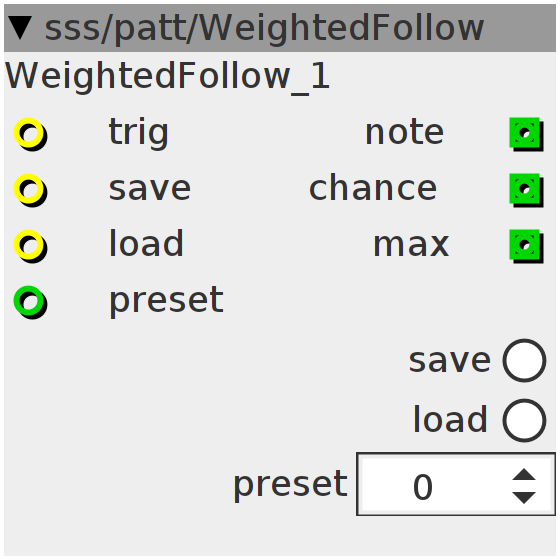WeightedFollow
WeightedFollow calculates the chance that certain notes will follow up on previous played notes. The internal array can be set externally with the WeightedFolRec module. WITHOUT THIS, THE MODULE WON'T WORK! Sending note and gate data to the WeightedFolRec will record for each note (48 notes, 4 octaves, wrapped when going over) which notes have a chance to follow up on it (each time a note is played after a certain note, that weight gets +1). Sending a gate/trigger to this module (WeightedFollow) will make it step through notes. The chance-array can be saved to a fixed filename with preset-index.
Inlets
int32 preset
bool32 trig
bool32 save
bool32 load
Outlets
int32 note
int32 chance
int32 max
Parameters
bool32.mom save
bool32.mom load
int32 preset
static const uint32_t LENGTH = 48 * 48;
int16_t *array;
int note;
int i;
int prev;
int ntrig;
int32_t max;
int32_t chance;
int select;
int T;
int strig;
int ltrig;
char c[64];
int offset;
int pval;
int load;static int16_t _array[LENGTH] __attribute__((section(".sdram")));
array = &_array[0];
strcpy(&c[0], "0:/chc000.tab");
offset = strlen("0:/chc");
pval = 0;int16_t preset = param_preset + inlet_preset;
if (preset != pval) {
pval = preset;
int i = preset;
int i0 = i / 10;
c[offset + 2] = '0' + i - 10 * i0;
i = i0;
i0 = i / 10;
c[offset + 1] = '0' + i - 10 * i0;
i = i0;
i0 = i / 10;
c[offset + 0] = '0' + i - 10 * i0;
}
int save = inlet_save + param_save;
load = inlet_load + param_load;
if ((save > 0) && !strig) {
strig = 1;
FIL FileObject;
FRESULT err;
UINT bytes_written;
err = f_open(&FileObject, &c[0], FA_WRITE | FA_CREATE_ALWAYS);
if (err != FR_OK) {
report_fatfs_error(err, &c[0]);
return;
}
int rem_sz = sizeof(*array) * LENGTH;
int offset = 0;
while (rem_sz > 0) {
if (rem_sz > sizeof(fbuff)) {
memcpy((char *)fbuff, (char *)(&array[0]) + offset, sizeof(fbuff));
err = f_write(&FileObject, fbuff, sizeof(fbuff), &bytes_written);
rem_sz -= sizeof(fbuff);
offset += sizeof(fbuff);
} else {
memcpy((char *)fbuff, (char *)(&array[0]) + offset, rem_sz);
err = f_write(&FileObject, fbuff, rem_sz, &bytes_written);
rem_sz = 0;
}
}
if (err != FR_OK)
report_fatfs_error(err, &c[0]);
err = f_close(&FileObject);
if (err != FR_OK)
report_fatfs_error(err, &c[0]);
} else if (!(save > 0))
strig = 0;
if ((load > 0) && !ltrig) {
ltrig = 1;
FIL FileObject;
FRESULT err;
UINT bytes_read;
err = f_open(&FileObject, &c[0], FA_READ | FA_OPEN_EXISTING);
if (err != FR_OK) {
report_fatfs_error(err, &c[0]);
return;
}
int rem_sz = sizeof(*array) * LENGTH;
int offset = 0;
while (rem_sz > 0) {
if (rem_sz > sizeof(fbuff)) {
err = f_read(&FileObject, fbuff, sizeof(fbuff), &bytes_read);
if (bytes_read == 0)
break;
memcpy((char *)(&array[0]) + offset, (char *)fbuff, bytes_read);
rem_sz -= bytes_read;
offset += bytes_read;
} else {
err = f_read(&FileObject, fbuff, rem_sz, &bytes_read);
memcpy((char *)(&array[0]) + offset, (char *)fbuff, bytes_read);
rem_sz = 0;
}
}
if (err != FR_OK) {
report_fatfs_error(err, &c[0]);
return;
};
err = f_close(&FileObject);
if (err != FR_OK) {
report_fatfs_error(err, &c[0]);
return;
};
} else if (!(load > 0))
ltrig = 0;
if ((inlet_trig > 0) && !ntrig) {
ntrig = 1;
max = array[note * 48 + 47];
chance = (int32_t)(GenerateRandomNumber() >> 5);
chance = chance - chance / max * max;
chance = chance < 0 ? chance + max : chance;
T = -1;
for (i = 0; i < 48; i++) {
if (T == -1) {
T = (array[note * 48 + i] >= chance) ? i : -1;
}
}
note = T;
note = note - note / 48 * 48;
note = note < 0 ? note + 48 : note;
} else if (inlet_trig == 0) {
ntrig = 0;
}
outlet_note = note;
outlet_chance = chance;
outlet_max = max;
// prev=note;